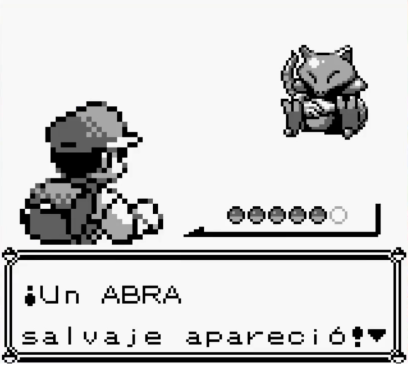On the 5th of October in 1999 my father took me to Toys R Us in Swansea and bought me a Game Boy Colour and Pokémon Blue. I remember eagerly reading the back of the box, excited to dive into the world that I recognised from the television. I was a fledgling gamer back then, having played only Crash Bandicoot 2 and Spyro 2: Gateway to Glimmer on the PlayStation One. Thus, with my first RPG in my chubby little hands, it took me a while to figure out how to exit the bedroom in Pokémon Blue, and an even longer time to figure out how to leave my house.
Tonight, I booted up Pokémon Rojo on my 3DS, something I’ve been meaning to do for a while, to test my Spanish skills. It’s the Spanish translation, by the way. I got through the intro without a hitch, and so far I’ve been relying on my almost encyclopedic knowledge of the game to figure out some of the more obscure vocab, such as remolino which means Whirlwind, or placaje which is Tackle. Two words you’re not going to come across often in your standard Spanish A-Level class. What strikes me is that in playing the game normally, you’re quite immersed in the language, with dialogue feeling (almost) natural and expecting you to know your grammar quite well. It’s been an enjoyable evening and a nice booster shot when it comes to my own Spanish skills. But it got me thinking.

I’ve read numerous times over the years that many people learn English through gaming. As English is one of the languages that most games are inevitably translated to, it seems only natural that a native of a different language be forced to struggle through it simply to play games. I’ve talked with people on Reddit, on GameFAQS and on some old 00s-era Final Fantasy message boards with people whose skill with English they attribute to having to play games in English or not play games at all. Now, it’s quite a well known theory that the best (or only) way to become proficient in a second language is to fully immerse yourself in that language. And I think this is something that gaming mimics quite well.
Within a game, specifically one heavy with text such as an RPG, you are exposed to new words constantly. In terms of dialogue, you have people speaking with slang and tone-switching within a single conversation (see: Dagger’s attempts at countrification in Final Fantasy IX), the use of idioms (see: Smell ya later from the first-gen Pokémon games), and people using complex vocabulary that encourage the use of a dictionary, or guessing from context. You’re exposed to proper grammar and sentence structure constantly, reinforcing conjugation rules and syntax rules without the boredom of a structured school lesson. Themes and events are referenced with regularity throughout the game’s story to make sure the player is up to speed and paying attention, proper nouns help keep things things in context, and all of this is aided by the presentation of the game in question. Menus and actual gameplay teach important vocab for gaming also. Any young gamer’s first RPG will teach them what fleeing is, what the words ‘Save’ and ‘Load’ have to do with each other, and learn words such as combat, mage, and cuirass.

And this is true whether you’re a child playing their first few games or an adult trying to learn an new language. When you play Suikoden: Tierkries in Spanish and your cursor is hovering over a small rodent enemy that brings up a box with the word Ardilla in big bold letters, you can quickly figure out that it means chipmunk. You don’t get that when you’re learning by reading a book. Games are engaging. They keep you interested and that in turn makes it easier to persevere. They’re no replacement for being thrust into that situation in real life, but I think they’re a close approximation. With some basic knowledge of a language, it can be a rewarding experience to play through a game, whether you are familiar with it or not, to further your skills with it. It gamifies the learning experience, and makes it a, in my opinion, much more rewarding use of your time.
So whether it’s a child getting a harder grasp on their first language, or a person of any age dipping their toes in another language, I think gaming is a very valuable tool we have at our disposal. I know that in the world of neuroscience, there is a mighty huge difference between first- and second-language acquisition, but I think the principles of the two remain similar when you’re looking at gaming as the medium through which that acquisition is accentuated. They’re engaging, repetitious and fun, three things that I, as someone who has varied deftness in a few languages, would consider key to the learning process.
For fun, here is a list of words that I learned from videogames without voice acting and therefore pronounced incorrectly and was then made fun of as a result, mostly by my parents: Arbalest, telekinesis, draught, aurora, panacea, metronome, kinesis, smithereens.